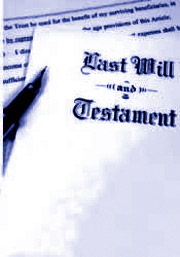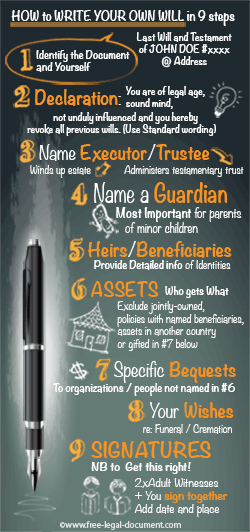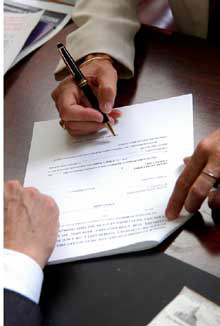How to Write a Will
Need to know how to write a Will that will clearly reflect your wishes
after your death and will be legally binding? With our very clear guidelines below it need not be a daunting task either.
It's never too soon! Ensuring your loved ones are taken care of as only you can best determine how, should be high on anybody's list of priorities.
Unfortunately a large number of people die without a Will (intestate), leaving it up to the courts to make decisions on their behalf.


Many people do not need a lawyer to draft a basic Will.
If your circumstances are such that you will not leave a very large estate behind, and the beneficiaries are fairly straightforward, it is a simple matter to show you how to write a Will in 9 steps.
The infographic here gives you a bird's eye view of the 9 steps which we explain in detail. We'll get to that in a minute.
We also supply a variety of printable free last will and testament forms (links supplied a bit lower down on this page) that can be used as sample documents to compile your Will.
Incidentally, you should also make a new Will when any of your circumstances change, such as the birth of a child, divorce, change of property, moving to a new address etc.
Free Last Will and Testament Templates and Related Free Legal Forms:
Free Will Forms - We've drafted a variety of printable Last Will and Testament forms, to make it easy for you to select a template most suited for your circumstances:
* Married people with minor children
* Married people with adult children
* Married people with adult and minor children
* Married people without children
* A single person without children
(Single people with minor children can also use a trust structure)
Testamentary Trust - How to create one, when it comes into effect and trustee duties
Testamentary Trust Will - Sample wording for this document
Affidavit of Domicile - To attest to the residence of a person at the time of death
How to write a Will: A step-by-step guide
1. Document Title
Typically the headline would be: LAST WILL AND TESTAMENT
2. Declaration
You will state your full name and residential address, with a declaration that:
- You are of legal age to make a will and are of sound mind and memory;
- This is your last will and testament, revoking all previously made Wills and codicils;
- You are not under duress or undue influence to make this Will.
Note: In giving your personal details, be as complete as possible - add any identification numbers, maiden names etc.
3. Name an Executor and/or Trustee For Your Will

People typically name the remaining spouse or main beneficiary of the estate as executor. This makes good sense, since they have knowledge of the assets and the interest to see to a speedy wrap-up of the estate and the probate process. A competent friend may also be nominated, but you should discuss their willingness to do this duty with them first.
You should also name an alternate executor should your first choice not be available or willing at the time. If you do not specifically name an executor in your Will, the courts will appoint one and executor's fees may be payable.
Get more information on choosing an executor and the duties of an
Executor of a Will as well as information on the Probate process.
And then the very important other person...
If you will be drafting a Testamentary Trust Will, you will need to nominate a trustee - if it is not the same person as the executor.
There's quite a bit of information you need to explore on this which we also cover in detail, starting with the page on Family Wills and Trusts.
4. Name a Guardian for your Minor Children in Your Will

If your children are of the age that they require guardianship and there is no remaining natural parent to take care of them, you should name a legal guardian in your Will or the court will appoint one. This is probably the most important clause for parents in determining how to write a will.
Have a serious discussion with your choice of guardian to confirm that he / she is prepared to take on this duty, before naming him / her in your Will. If your choice is a stable married couple, state both their names. Unlike temporary guardianship a legal guardian may be responsible for your children for a long time and must be chosen with care.
Guidelines for choosing a guardian, can assist you in naming a legal guardian in your will.
5. Details of Beneficiaries in Your Last Will
Name your spouse or life partner, children and other beneficiaries specifically and without leaving any doubt as to their identity. Name alternate beneficiaries in case of simultaneous death.
In most cases a spouse has a right to inherit. Should you disinherit your spouse and it is contested in court, your Will may be overruled. You need to consult with an attorney to get information and advice if you do not want your spouse to inherit.
6. Details of Your Assets
An important part of how to write a Will, is to distinguish between estate assets that are already assigned to beneficiaries in the event of your death and those that are not.
Assets that are not part of a Will, may be any policies where you have already specified a beneficiary, joint ownership or joint tenancy of property, payable-on-death bank accounts, trusts etc. (If a policy does not have a beneficiary named, it becomes part of the estate and can attract executor's fees.)
If you have assets in a different country, you should make a separate Will specifically for that country and exclude those assets from the Will made in your home country. Every country has different inheritance laws and taxes and lumping all assets together can create serious problems and delays. You should investigate how to write a Will for foreign assets.
7. How to Write a Will to Cover Specific Bequests
Under the heading "BEQUESTS" you could name persons or organizations whom you wish to inherit specific property or cash sums.
In the clause thereafter, you will state the following:
Apart from the items listed in # above, I bequeath the remainder of my assets to ...
8. Funeral Arrangements Specified in Your Will
You can express your wishes on whether to be cremated, buried or have your remains disposed of in any other way, as long as your wishes do not contravene any laws in your state or country.
However, your loved ones may not have access to your Will in time to follow your wishes. Also create a separate written document with your desires and keep it in a place where it can be easily found by your family.
Your last will and testament is not the document to specify how you wish to receive treatment in a medical crisis. Please refer to our Living Will page for more information.
9. How to Sign Your Will

You have to sign your Will in the joint presence of witnesses, since they will in fact be witnessing (see) that you are indeed the signatory of the Will and under no duress to do so. Inform them of the fact that it is your Last Will and Testament that you are signing. They do not need to know the content.
The actual date and place of the signing must be recorded in writing.
It is highly recommended that everyone sign (or at the very least initial) every page of the Will. This serves as evidence that no additional pages were inserted at a later date.
Signatures of the Witnesses to a Will
A minimum of two witnesses in most states and countries (3 in Vermont) are required to witness the signing of your Will. Their full names, addresses and signatures should be on the document.
The witnesses have to sign in the presence of the person making the Will.
You must add a declaration that they witnessed your signature, that they are legal adults and of sound mind and that they consider you of sound mind, adult age and under no duress or undue influence to sign your Will. The date and place of their signing (same as yours) must be recorded.
Note: It may not be a requirement in your jurisdiction for the witnesses to sign in one another's presence. Practically though, it does not take long for the will maker and witnesses to complete their signatures whilst all being present at the same time. Our last will and testament templates have the witness attestation worded as such. If your witnesses will not be signing in one another's presence, you will need to amend their declaration accordingly.
Can a Witness to a Will Also be a Beneficiary?
Important Note: Most states and countries require that witnesses must not be beneficiaries of your Will in any way whatsoever. Nor should their spouses or life partners be beneficiaries of your WillThe reasoning behind this requirement is to remove any presumption that the person making the Will was under duress to bequeath something to a witness.
If a witness is indeed named as a beneficiary, it shall not make the Will invalid. However, the court may declare such bequest void (invalid) or reduce its value to that permitted in law.
Incidentally, your executor may witness your Will, but the same rule applies: he/she should not be named as a beneficiary in your Will.
Whilst it may be legal for a witness to be a beneficiary - in some jurisdictions - it is simply best practise to avoid any future challenges to a bequest as far as possible. Get persons with no interest i.e. they do not inherit anything under your Will to act as witnesses!
|
Comment from a site visitor re Wills in Puerto Rico:
I recently had a fully probated U.S. Will dismissed in Puerto Rico because the Witness declaration lacked the time-of-day, a local requirement. The time zone must also be stated if not GMT. My advice to anyone trying to leave property in Puerto Rico by Will is to find a member of the Puerto Rico bar to draw up the Will, (because of the particular administrative requirements in Puerto Rico) and not to rely on U.S. rules or lawyers. |
Why you should have numbered paragraphs in your Will
An important part of how to write a Will or any legal document is to number the paragraphs in order. This is a simple way to confirm that the document is complete with no missing pages or additional pages inserted.
It will also make the drafting of any Codicils at a future date easier to cross reference. For example, in your Codicil you could state:
"I am adding the following bequests after clause 9"
Should you have your Will notarized?
A final optional part - compulsory in Louisiana, and always advisable - of how to write a Will is to have your Will notarized.
The signing process will be done in the presence of a notary public or commissioner of oath and the identity of the testator must be proven (photo identification must be provided). The notary public will add a statement that the Will was properly executed i.e. that the correct procedure was following during the signing process.
If so duly notarized, the Will becomes Self Proving during probate. This means that the court need not call on the witnesses to testify.
How to Amend a Will
In the past Codicils were added to Wills to reflect changes - rather than retyping sometimes lengthy documents. These Codicils also had to be witnessed and/or notarized and could be confusing. It is much easier nowadays to amend the Will electronically and produce a new complete document, especially if you have a number of changes that you wish to make.
However, for any simple changes to your will you can execute a Codicil to Will to:
- Change an executor or guardian;
- Add a bequest;
- Delete a beneficiary;
- Add an explanation of how a bequest should be handled, etc.
Note: Making handwritten changes on your Will could be problematic because it may be challenged whether it was made by the testator or someone else. It may also not meet the formal requirements for amendments in some jurisdictions. Rather make an Addendum / Codicil to Will.
Addendum to Will - Step by Step: How to make a codicil / amendments to your Will without having to make a new Last Will.
Codicil to Will Form - Free templates to assist you with making your own codicil.
Revoking a Will
How to Revoke a Will - Revocation of a Will can be done in various ways. We supply the wording format when making a new Will as well as a stand-alone Revocation of Will template.
How to write a living will, social media will and additional guidelines for your last will and testament:
Living Will - Guidelines for this document
Living Will Form - Your advance health directive template
Digital Assets - Guidelines on how to manage them after you pass away
Social Media Will - Free template to give instructions to your digital executor
Legal Wills - Guidelines for unmarried partners
Disinherit - Definition of the term and how to disinherit a child or spouse
Contesting a Will - Who can do it, on what grounds and the function of a no-contest clause
Legal Wills - Frequently Asked Questions
In showing you how to write a will, we will cover the requirements basic to any will. It is perhaps easiest to do your draft and then final will on a computer where you can store and amend it from time to time - the printout will then be witnessed and/or notarized.
A holographic will (handwritten will) needs to conform to certain requirements too and is not legal in every territory.
The information on this site can show you how to write a Will and provides a free Will form, but if you wish to make a complex Will or need help with estate planning and asset protection, you must seek professional guidance.
Ohio Last Will and Testament - State specific information contributed by Nathaniel E. Spitler, Managing Partner at Spitler Huffman, LLP. His practice areas include Wills and Trusts, Probate and Estate Planning.
You are here:






